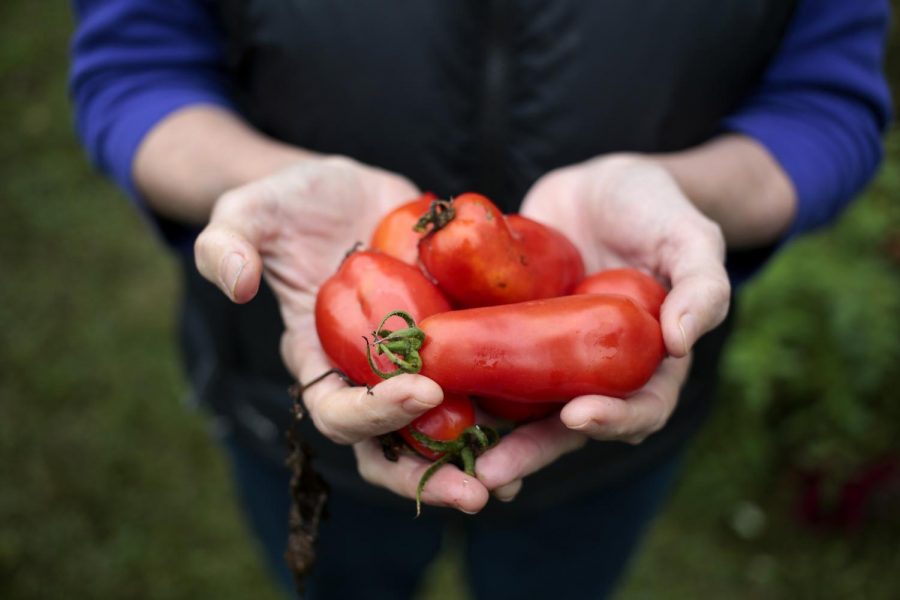Urban farming movement sprouts in Bowling Green
October 6, 2015
On a crisp, late-summer morning while Bowling Green resident Tiara Na’puti knelt on the bed of her garden to dig sweet potatoes, she noticed a young girl lingering by her yard on the way to the school bus. Na’puti stopped her digging to raise a 3 1/2-pound potato into the air. She asked the girl if she had ever seen a crop harvested directly from the Earth.
The girl replied, “No, I have walked past your home almost every day and never realized what was there.”
Na’puti’s residence is home to a permaculture garden that is part of an urban farming movement. This practice of cultivating, processing and distributing food in or around a village, town or city is spreading throughout the U.S. in a majority of major cities, including the Bowling Green area.
In fact, there are currently more than 60,000 residential, community and partner gardens that are registered with the Urban Farming Global Food Chain.
The WKU community is also latching onto the movement. Several professors have joined in: Erika Brady, a folk studies professor and head of the Department of Folk Studies and Anthropology, Na’puti, an assistant professor in the Institute for Citizenship & Social Responsibility and Amanda Crawford, an assistant professor in the School of Journalism and Broadcasting.
In 2014, when Crawford and spouse Toby Fatzinger relocated to Bowling Green from Phoenix, they left behind their home recording studio along with the infertile desert soil.
In the new city, the couple wanted to establish a home that represented their ideals and could influence the surrounding community. They chose a downtown Victorian home situated beside a halfway house and across from a juvenile detention center because they want to address large-scale imprisonment.
“We hope by locating our arts venue across from structures of incarceration and next to a halfway house, we can help to raise consciousness on that issue as well,” Crawford said via email.
It thus became the “FFOYA House,” a community home named after the couple’s indie band, Former Friends of Young Americans, that strives to bridge the gaps among local artists, musicians, activists and community members.
“Buying local is an important thing to me and supporting your local businesses rather than major corporations or industries,” explained Crawford. “I have a concern about the direction that our world is going and whether the lifestyles we’re living are sustainable.”
The FFOYA House is home to a recording studio open to local musicians, and the couple has also transformed their front yard into an organic permaculture garden.
“Urban living is far more sustainable than suburban sprawl, so we hope we can demonstrate, even in a small way, that sustainable agriculture and urban living are compatible,” Crawford said via email.
A variety of produce has since grown there. Ripe orange tomatoes, red and green hot peppers, organic basil and a substantial amount of other plants grow throughout the yard. The couple’s garden is also home to a hugelkultur mound that was introduced to them by local farmer Tim Kercheville.
A hugelkultur mound is a wood-core raised bed filled with rotted wood, organic matter and soil that captures and stores rainwater to create soil fertility, according to Kercheville, a 33-year-old from Orange County, California.
“It is essentially a composting system that grows crops,” Kercheville explained. “The compost is not just light organic matter but also really bulky carbon like trunks of trees.”
Kercheville was introduced to hugelkultur and permaculture gardening in 2011 while he worked as a stonemason for WKU. One day, he noticed vines were covering a slope in the backyard of his cabin home. When he pulled the vines away, they revealed the ruins of an early 20th-century South Vaison stone-terraced garden.
Kercheville saw this discovery as an opportunity.
“It was dilapidated and pretty much in shambles, but over the next three years, I terraced the slopes again and started planting multiple types of crops in them,” explained Kercheville.
Over several years, Kercheville has helped many community members construct hugelkultur mounds and permaculture gardens at their own homes. Among them is Na’Puti’s.
After moving to Bowling Green from the overpopulated, “crammed-for-space” environment of Los Angeles, Na’puti realized her desire to reconnect with the earth and the cultural ideals of her native country, Guam.
“In my cultural community, connections to land are really important,” explained Na’puti. “Connections to land are often hindered by certain forces, like corporations and industries, that are unjust.”
By cultivating a sustainable food source in her yard, Na’puti feels she is helping to counteract food mass-produced by corporations and reconnect with the earth.
“Sustainability is something we all play a role in by working to find different ways in our unique spaces and small everyday actions to take steps in living in a more just and sustainable world,” she said.












